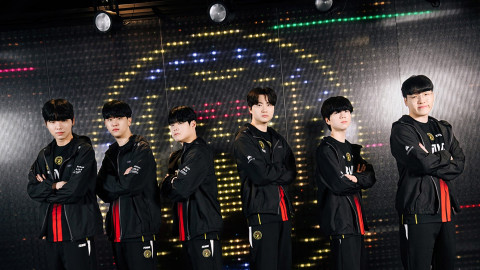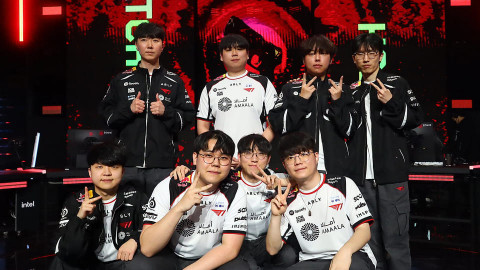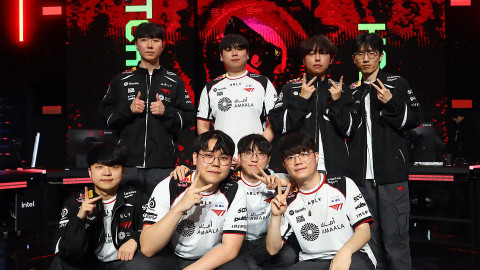
On November 10th, the global game testing platform 'G.Round' and the game service specialist '2Bytes’ entered a strategic partnership. Game developers planning global expansion can leverage G.Round to receive feedback from users worldwide during the development phase, enhancing the game's overall quality. Additionally, 2Bytes can provide localization, QA, and operational services to support entry into specific country markets. Games that receive positive reviews on G.Round may also have the opportunity for investment consideration through GXC's accelerator 'GTR: Global Top Round' or the venture capital firm 'Round Ventures’.
During the GTR 2023 event in Malta from November 28th to 30th, Inven had the opportunity to speak with GXC CEO Danny Woo and 2Bytes CEO Ham Young-chul about the strategic partnership and its implications for game developers aspiring to go global.
Please introduce the roles of G.Round, GTR, and Round Ventures.
Danny Woo: We initiated the GTR Game Accelerator in 2015 intending to aid the growth of promising game companies. Our vision wasn’t initially about creating a global gaming ecosystem. We started GTR in 2015 and operated the GTR Conference annually, where we directly met with the top 20 game companies and invested in 10 of them. As we held the conferences in several countries around the world, we were able to get support from that country's government and regional partners, and this allowed us to promote to the world what GTR was doing and create a global network.
GTR aims to be a validation point for game studios, similar to how 'Y Combinator' plays a crucial role in the startup industry. They’re an accelerator that focuses on seed investment and is known to have supported companies like Airbnb and Dropbox. So if they invested in you, that means you’re somewhat verified. This affects the follow-up investments or entering partnerships.

Since there weren’t any accelerators like this in the game industry, we established one named GTR. We've faced challenges as an accelerator for about three years, having invested in about 25 companies globally and introduced to partners around the world. However, in several cases, the partners and investors thought it wasn’t enough, and they wanted to see more before deciding to avoid risks.
So early-stage developers have to grow a bit before the verification process for investment, but we observed a need for more alignment between the point when studios seeking growth need funds and the point when publishers or investors seriously review them. Many studios found it challenging to progress beyond the initial growth phase, and decision-makers lacked clear criteria for assessment.
This led us to G.Round. We aimed to provide publishers and investors with objective user preference data from G.Round to facilitate informed decision-making. By testing games on G.Round, gathering user feedback, and presenting the data to publishers, we sought to bridge the gap in the assessment process, and we had a few cases where they were matched.

However, publishers mostly provide development fees for one game title. For developers to continuously operate to create subsequent games, more investments are necessary. In the same way, Venture Capital mostly wants to reduce the risk and see the sales after launching the game before they make more investments. This makes it difficult for developers as they need funds right away.
We identified the need for Venture Capital to invest based on user preferences and potential rather than solely focusing on post-launch revenue. As a response, we plan to officially establish 'Round Ventures' in the first quarter of next year. We aim to co-invest with partners, injecting 2-3 million USD in the Pre-Series A stage and 5-8 million USD in the Series A stage. This approach allows developers to pursue subsequent games, whether the first one succeeds or fails, providing a more sustainable future.
Ham Young-chul: When a renowned developer founds a company, it is relatively easier to secure investments. However, for smaller studios, even if they manage to secure funding, it often covers only the expenses needed to release and operate a game for a few months. Smaller studios may face situations where they have developed a game but have to close the company within a few months due to delays in the launch schedule.
In industries like gaming, film, or drama, having a blockbuster with the first content is desirable, but it's realistic to expect one or two failures before achieving a major success. Unfortunately, many Korean studios, despite launching a game, face the reality of shutting down a company within months due to various reasons. In that context, I appreciated the GXC group's commitment to supporting the establishment of sustainable development studios, which can continue to develop subsequent titles, even when facing challenges.
Why should game developers use G.Round?
Danny Woo: Many games developed in secret and revealed at release often fail. They fail for many reasons, but quite often, there are issues with the game quality. Also, negative reviews early on can harm the game's sales and reception by other players. To prevent this, it's crucial to actively engage with gamers and incorporate their feedback throughout the development process. However, it's not practical for smaller developers to recruit testers worldwide. G.Round allows developers to conduct global tests efficiently and obtain analytical data.

Has 2Bytes utilized G.Round?
Ham Young-chul: We conducted tests for our upcoming RTS game, 'Space Gears.' We wanted to avoid situations where we develop a game secretly, release it to the market, and receive negative feedback, leading to the game's closure. We initiated development in August of last year, performed Steam playtests in June of this year, and simultaneously gathered global user feedback through G.Round.
We conducted private tests to collect more detailed data, receiving feedback from around 200 users. The G.Round platform allowed us to hear users' voices on specific aspects and provided detailed reports with objective metrics.
The worst reaction when having a CBT is when people aren’t interested, and there are little to no responses. If there are no reactions, developers don’t know what has to be fixed. Many games release Steam playtests or distribute APK files, but the feedback received is often less enthusiastic and detailed than that from G.Round.

Danny Woo: You don't want to spend millions developing and releasing a game, only to have it fail at the box office due to initial negative feedback. Therefore, I think it's important to test the game early in the development stage and make changes based on user feedback, so that you can release a more complete game and make it a success.
The key is how the criticism is received. G.Round enables developers to receive highly detailed and professional feedback from over 400,000 gamers worldwide. We plan to introduce features soon that will allow interviews with users who leave feedback and analyze videos of specific users playing the game.
What platforms can you test on G.Round?
Danny Woo: PC games can have public tests only, while moblie games and blockchain games can have private tests. VR is currently in the research phase. However, since all users must have VR hardware for VR content testing, we are currently surveying users to determine the extent of VR device ownership and types.
What are the conditions that can be set when testing games on G.Round?
Danny Woo: There are basic parameters such as country, gender, and age. Furthermore, recruitment settings can be detailed based on the user's proficiency in certain game genres and hardware specifications. However, setting too many conditions may reduce the number of eligible users.
Initially, we received test requests for 50 to 200 users, but recently, we started receiving requests for 300 to 1,000 users. G.Round has about a thousand private testers, and if stringent conditions are set, we invite regular platform users who meet the criteria to participate as testers. We plan to increase the number of private testers to 2,000 by next year.

How much gameplay demo is needed to conduct testing on G.Round?
Danny Woo: You should be able to play for at least 30 minutes. If the demo is too short, receiving accurate feedback is difficult. On G.Round, for both public and private tests, users are required to play the game for a minimum of 30 minutes, and then participate in reviews or surveys. If the playtime is less than 30 minutes, the users aren’t allowed to participate in reviews or surveys. This is a minimal measure to receive feedback from actual players, and we plan to apply technology to screen fake or plagiarized reviews using current AI techniques.
How did the 400,000 users gather on G.Round?
Danny Woo: In overseas development, it's common for startups to open Discord channels for game development, where developers and gamers freely exchange opinions when creating a game. By maintaining active communication, gamers are more likely to participate in tests whenever the game version is upgraded.
When we invested in about 25 development companies, the Discord or social media followers for those games were roughly around 10,000. These users were highly interested and proactive in indie game testing, so we considered gathering them together. We also gathered influencers and their viewers. Furthermore, we approached university students majoring in games, asking them to recommend passionate gamer friends in their surroundings. Through these efforts, we currently have a user pool of 400,000 worldwide.

Ham Young Chul: In North America and Europe, it's common to use Reddit or Discord during the development process. Test keys are distributed there, allowing users to play the game and provide feedback.
After founding 2Bytes and localizing global target games while actively setting up and managing Discord communities, I realized that this process is crucial for game developers. Refining games based on such feedback increases the chances of success.
Moreover, fans giving positive reviews on the Steam platform after the launch have a significant impact on subsequent success. Therefore, I strongly recommend utilizing community platforms. From this perspective, G.Round is a valuable platform for accumulating fan support.
G.Round has around 50 streamers; what is their role?
Danny Woo: They are acting as ambassadors for G.Round. Influencers primarily do broadcasts, so they are mainly involved in public testing. They introduce and play games they like during live broadcasts, and we pay them per review.
We intentionally do not contact celebrities with a massive number of followers or subscribers. Since public testing is for the development stage, not for massive promotion after the game's release, it's unnecessary to have influencers on such a large scale, considering the budget. Typically, influencers with 100,000 to 1 million followers are engaged. However, for future game launches, we plan to collaborate with influencers with over 1 million subscribers.
G.Round and 2Bytes have entered into a strategic partnership. What specific form will this collaboration take?
Ham Young Chul: One of the thoughts I had since the founding was that the era of relying solely on Korean games in Korea has ended. made in Korea should be created for the global market. 2Bytes supports localization, global customer support, quality assurance, and content marketing services to facilitate smooth global expansion for Korean games.
We initially expanded from outsourcing to publishing, and publishing is similar to venture capital investment. Instead of investing in a single game and hoping for success, we aim to increase the probability of success by investing in multiple games simultaneously.

If, for example, we publish ten games simultaneously, only some of them may succeed. However, 2Bytes now has a gateway that increases the chances of success in making games popular. From this perspective, G.Round is an incredibly important platform for 2Bytes.
2Bytes, based on the extensive network built over three years in Korea, recommends game developers to G.Round for testing. After passing the test, 2Bytes considers co-publishing and, together with GTR or Round Ventures, evaluates investment opportunities to grow globally. It's a strategic partnership that provides developers with a comprehensive set of opportunities, from development to publishing to investment, to drive global success.
Danny Woo: Co-publishing by 2Bytes also involves risks, so it can be seen as a form of investment. When an investment is necessary, there must be data for decision-making. Using G.Round’s global user test results data provides that information.
Furthermore, the fact that 2Bytes engaged in co-publishing becomes a signal for us. Round Ventures views games 2Bytes has published jointly as validated games and can more easily consider investments. Therefore, 2Bytes' recommendations have a priority when we evaluate investments, and this is one of the significant advantages for developers when collaborating with both companies.

On the other hand, games that Round Ventures invests in can also be connected with 2Bytes. Especially, many development companies in North America and Europe are interested in the Asian market, but due to language barriers or difficulty understanding the market, they often give up. Therefore, it could be a good opportunity for 2Bytes. 2Bytes mostly sends Korean games into the global market, but it can also send foreign games into the Korean market. There were many potential opportunities in this strategic partnership.
What does 2Bytes emphasize about Co-Publishing?
Ham Young Chul: What we mean by co-publishing is sharing joint responsibilities and returns with the development company. It's not about the publisher taking all the benefits when it goes well or immediately giving up developer support when it doesn't. Co-publishing involves sharing responsibility for the game and sharing profits together.
To achieve this, increasing the success probability of each game is crucial. We plan to address this using G.Round and 2Bytes’ service capabilities. Additionally, 2Bytes is developing solutions like game AI translation, which will lower game service costs and create a structure where more profits go back to the development company. This is the core element of the co-publishing concept.
Is English the only available language on the G.Round website? Also, can games without English subtitles be tested on G.Round?
Danny Woo: Currently, it's in English only due to limited resources. Regarding the site, we are considering collaboration with ChatGPT. From the user's perspective, if they write in their native language, such as Korean, it will automatically be translated into English. Currently, developers read reviews written in various languages using translation tools, but in the future, we plan to implement an automatic translation feature within the system to make it easier to read.
However, for testing, it's not easy to cater to each language for every game. Language localization requires cooperation from partner companies, and we can consider addressing this with 2Bytes.
Ham Young Chul: Currently, G.Round conducts two game tests per week. When a development company requests testing for a specific country and desires translation, we will promptly translate it and incorporate it into the game build.
At GTR 2023, I observed that many development companies included Korean as their desired language. Even if we focus on a single market excluding North America and Europe, Korea ranks fourth. Therefore, we may consider translating games and conducting tests in the Asian region when developers are curious about the reactions of Asian users.

Are there any upcoming features for G.Round?
Danny Woo: G.Round is introducing AI technology to efficiently organize and analyze feedback since there is too much already. For example, it will extract three keywords from negative feedback, classify comments according to each keyword, and provide them for easier viewing.
We also plan to implement technology that detects fake reviews or copied reviews. We maintain the quality of the reviews by tracking down reviews copied from other places. Also, we plan to have a function to find where it says the game is fun in the review, but the user has bored reactions in the video.
What should game companies keep in mind to succeed in global expansion?
Danny Woo: The movie 'Searching for Sugar Man' tells the story of South African travelers discovering an obscure American singer in a cafe, buying his LP, and turning him into a superstar back in South Africa. Fans raised money, sent him on flights, organized large concerts, and even when he returned to the U.S., he continued to live the life of an unknown artist.
I see parallels with the game industry. Not everyone will love the game I create, so understanding who will enjoy and purchase the game is crucial. Utilizing statistical metrics through platforms like G.Round to identify regions and demographics showing interest allows for better decision-making on target users and markets, increasing the probability of success.
For example, with a budget of 2 billion KRW, if unsure which region the game will succeed in, spending 100 million in 20 different regions means that even if a successful region is found later, 1.9 billion has already been wasted. Knowing the region beforehand and investing half the 2 billion wisely can lead to greater success.

Moreover, in Korea, there is a lack of investors for game content, and funds are limited. While the Korea Creative Content Agency provides support, there's a shortage of investment institutions and venture capitals. The areas that a development studio can explore depend on the flexibility of their finances.
"Squid Game" was a project in which no one in Korea invested for ten years. Regional country managers make Netflix's content investment decisions, and the Korea region manager decided to invest 20 billion KRW because "Squid Game" seemed fresh. They aimed for niche market success, but it turned into a global hit that no one expected. Funds are necessary for content to reach the world, but the gaming industry lacks places like Netflix that bravely invest in various content.
Through GTR Accelerator and the soon-to-be-established Rounds Ventures game fund, we will invest diligently. Still, it would be great if more institutions were investing in game content and game companies. Discussions have begun on how the Korea Creative Content Agency, G.Round, and 2Bytes can collaborate. Suppose a method is created to invest at the right time, actively using G.Round data. In that case, developers can receive sufficient funding at the right time, leading to the launch of better game content that can succeed in the global market.
Ham Young-chul: I want to emphasize not fearing the global market. If, when making a film in Korea, it was created with a half-hearted attempt to target the global market, like hiring foreign actors haphazardly, it probably wouldn't have worked well. After creating "Squid Game," instead of immediately considering a global release, if they looked at the initial Korean reaction and it wasn’t favorable, it may not have been released globally.
Of course, much preparation is necessary for a global release, but there is no need to fear the term global. Rather than awkwardly incorporating Western sensibilities during the development stage, it is better to confidently showcase and test the charm you possess.

Sort by:
Comments :0








